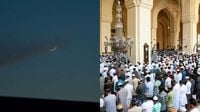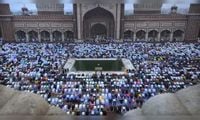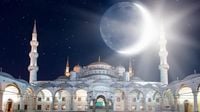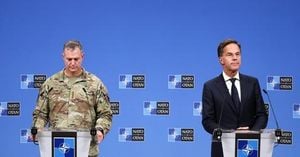As the holy month of Ramadan approaches its conclusion, Muslims around the world are eagerly anticipating the celebration of Eid al-Fitr, which marks the end of fasting and spiritual reflection. In 2025, Eid al-Fitr is expected to fall on either March 30 or March 31, depending on the sighting of the crescent moon. This annual observance is not just a religious event; it encompasses a rich tapestry of cultural practices, family gatherings, and acts of charity.
Ramadan, which began on March 2, 2025, following the crescent moon sighting on March 1, is observed through fasting from dawn until dusk. The Islamic calendar is lunar, which means significant dates like Eid shift approximately 11 days earlier each year in the Gregorian calendar. This year, the last day of fasting will conclude at Maghrib, just after sunset, as Muslims prepare for the festivities of Eid.
In India, the celebration of Eid al-Fitr will hinge on the visibility of the crescent moon on March 30. If the moon is sighted, Eid will be celebrated on March 31; otherwise, it will be observed on April 1. This practice is echoed in many countries, including Saudi Arabia, where the crescent moon sighting will also dictate the date of Eid. The UAE’s Moon Sighting Committee is set to begin its observations on March 29, and if the moon is confirmed, the UAE has announced a four-day public holiday for Eid.
As excitement builds, many are preparing for the traditional aspects of the celebration. In India, families will rise early, donning traditional attire—women in salwar kameez and men in kurta and pyjama, often accompanied by traditional caps. They will gather for special prayers at mosques or community centers, exchanging greetings of ‘Eid Mubarak’ and sharing festive meals together.
In the Greater Toronto Area, local organizations have also begun to announce prayer locations for Eid. The Islamic Society of North America (ISNA) will hold prayers at Jami Mosque, while the Muslim Association of Canada (MAC) will gather at Nathan Phillips Square. Such community events are vital for fostering a sense of belonging and shared joy among Muslims in the diaspora.
Gift-giving is another cherished tradition during Eid. As many seek the perfect presents for their loved ones, luxury items such as bespoke leather-bound Qurans, artisanal oud-infused tasbeehs, and gourmet date assortments are popular choices. A guide from Emirates Man highlights these thoughtful gifts, noting that they not only serve as tokens of affection but also as lasting investments.
However, the celebration is not just about material gifts; it embodies the spirit of generosity and community. Acts of charity, known as Zakat al-Fitr, are obligatory for Muslims before attending Eid prayers. This charitable giving ensures that everyone, especially the less fortunate, can partake in the festivities. The significance of charity during Eid reinforces the values of compassion and community support.
Despite the joy that Eid brings, there are also underlying tensions regarding the methods of moon sighting. In recent years, Saudi Arabia has faced scrutiny over its moon sighting practices, with some accusing the kingdom of ‘faking’ sightings. Critics argue that the Saudi authorities often announce the sighting of the crescent moon on dates when astronomers assert it would be impossible to see. This controversy raises questions about the reliability of moon sightings and whether Muslims should follow local or Saudi announcements.
In India, the lack of a centralized authority for moon sighting leads to varied practices. Local committees in different regions make the calls, with major mosques like Delhi’s Jama Masjid playing pivotal roles. This decentralized approach allows for diversity in practice but can also lead to confusion, as families may find themselves celebrating on different days.
As the date draws near, many are left wondering: will Eid be celebrated on March 31 or April 1? Reports indicate that astronomers believe the crescent moon will not be visible on March 29, which could lead to a later celebration. This uncertainty highlights the importance of community and tradition in navigating the complexities of religious observance.
In the meantime, preparations continue across the globe. Families are gathering, meals are being planned, and gifts are being wrapped. The spirit of Eid al-Fitr transcends mere dates; it is about unity, joy, and the reaffirmation of faith among friends and family.
As the holy month of Ramadan concludes, Muslims worldwide will come together to celebrate Eid al-Fitr, embracing the values of gratitude, charity, and community. Whether through shared meals, prayers, or acts of kindness, the essence of Eid is a reminder of the bonds that unite believers in faith and fellowship.
With the anticipation of Eid in the air, one thing is certain: regardless of the date, the spirit of celebration and togetherness will shine brightly, illuminating the hearts of those who partake in this cherished tradition.









